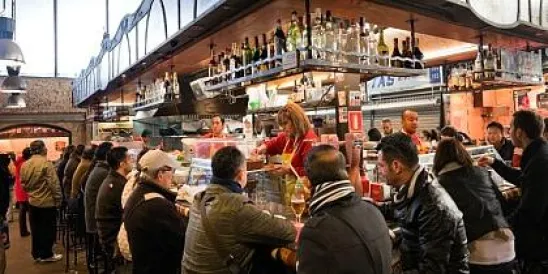Quick. Define Twin Peaks. Other than the obviously now dated TV show, up until a couple of months ago, the only other definition of Twin Peaks was a restaurant chain that featured double entendre advertising, scantily clad women servers and “man food.” Now Twin Peaks has a new definition; Twin Peaks means a mass gunfight that left a number of people dead, a lot injured, more than 150 people arrested with a 1,000 weapons seized, and incidentally, a terminated franchisee who had invested more than $1,000,000 to open their restaurant and a franchisor trying to figure out how to do damage control. Those of us in the franchise business immediately recognized a franchised system’s nightmare and watched from afar to see how the franchisor and franchisee would handle the disaster. The consensus of many seems to be “not very well.” The important question, however, is what lessons are there to be learned from the Twin Peaks debacle.
The short answer to the question that a franchisor, as the leader of a franchise system, has to be prepared in advance of a public relations disaster, not only from a legal standpoint but also from a public relations standpoint. The reason is simple. It is not a question of if a franchise system will be faced with this type of situation but when it will happen. Only through assuring that the franchise agreement contains terms that allow the franchisor to take action against the franchisee if necessary and merited, and by having a disaster response plan in place that can limit damage to the brand, can a franchise system endure and recover to continue to be successful.
Legal Issues. What a franchisor can legally do in situations like the Twin Peaks shootout is obviously dependent upon what the franchise agreement provides. When the news broke that Twin Restaurant Franchise, LLC, the franchisor, had almost immediately terminated the franchise agreement of the Waco franchisee, curiosity prompted the question “I wonder what their franchise agreement says” because franchisors often do not have clear contractual rights to terminate the franchise agreement in situations like the Waco incident. Most franchise agreements provide that the agreement can be terminated if the franchisee is convicted of a felony, and a majority also provide that the franchisor has the right to terminate if the “franchisee commit[s] any other act which may adversely affect or be detrimental to us, other franchisees, or any of our rights in and to the [marks].”[1] In some cases, the franchise agreement is drafted in such a way as to require some causal connection between the criminality and the damage to the brand. The problem in the Twin Peaks situation was that, based upon the publicly known facts, the franchisee was not convicted, or even charged with a felony, and it is subject to questions whether the franchisee’s acts in Waco are what led to the damage to the brand.[2] The first lesson to be learned, therefore, is to look at your franchise agreement and consider whether changes are necessary. Examples of possible changes include assuring that the criminal acts/damage to the brand are independent defaults and that the language does not appear to require a causal connection between the crime and the damage to the brand, the grant to the franchisor of the right to make the determination of what conduct or omissions by the franchisee impair the brand and the grant to the franchisor of the right to terminate without cure if the franchisor reasonably determines that a threat or danger to public health or safety is likely to result from franchisee’s acts or operation.[3] Clarity is the key and to the extent possible, the agreement should be clarified with anticipated risks in mind.[4]
We are a good corporate citizen. In the aftermath of what was obviously a difficult situation, it was hard not to get the impression that the franchisor and the franchisee were both pointing fingers in different directions attempting to deflect responsibility.[5] From a franchise law perspective, we can all understand that instinct since the franchisee is an independent contractor and is ultimately responsible for what occurs at their location. This is particularly true in an evolving legal environment where efforts are being made to ignore the franchisor/franchisee distinction and too much involvement by the franchisor will be cited as evidence of control exposing the franchisor to liability. Even so, we understand the franchisor/franchisee distinction. The public does not. They have even less understanding where the public safety and health are put at risk (as was the case here) and both franchisor and franchisee are “passing the buck.” The unfortunate truth is that the public is going to hold both the franchisor and the franchisee responsible regardless of the legal distinctions and the franchisor has the responsibility to limit the damage to the system as much as possible. This requires having a team in place with authority at the highest level to serve as the public face for the franchise system. Retention of a good public relations firm and designation of the internal disaster management team before the crisis happens is essential. The immediate response should be to have franchisor personnel with experience interacting with the media on the ground to answer questions as soon as possible and to tell the story from the system’s side. This should include responses on social media where much of the negative publicity today is spread. At the very least, they should be there to make it clear that the company cares about the event, that it finds the event unacceptable and will do whatever it can to resolve the situation and to regain the public trust (including the termination of the franchise agreement if necessary.)
This response team cannot be limited to the franchisor. A franchisor should also provide training for franchisees about how to deal with crisis management. In the Twin Peaks case, it appeared that the police were blaming both the franchisor and the franchisee, the franchisor blamed the franchisee and immediately terminated their franchise agreement and the franchisee was making public statements that termination was not merited and that they did nothing wrong. While these approaches make sense from a legal perspective, all they did was cement the thinking in the public’s mind that there was plenty of blame on both sides. Certainly, where, as here, public officials express concern, this concern should be taken seriously and proactively addressed even if there is increased exposure from the franchisor and franchisee working together. At the very least, every effort should be made to define possible risks, to put communications personnel and others with authority in place to respond before the need arises, to assure communication lines between the franchisor and franchisees are well defined and to make it clear that public officials recommendations are always followed.[6] Twin Peaks clearly did not have these elements in place, and there are a number of public relations consultants that point to the Twin Peaks situation as an example of what not to do.[7]
What is apparently overlooked in the Twin Peaks situation is the criminal behavior that led to the crisis. Even though the crisis may not be of their own creation, franchisors are well advised to proactively look at steps that can limit any damage when the crisis occurs.
[1] A review of franchise agreements of many of the larger franchisors disclose both of these provisions, some with variations, such as the addition of conviction of misdemeanors involving moral turpitude, violation of anti-terrorism laws and similar provisions.
[2] Such as the criminal acts of others. The franchisee appears to be taking this position in their public announcements. here
[3] There are obvious restrictions on the right of franchisors to terminate in states with franchise relationship laws and under non-contractual theories, such as the duty of good faith and fair dealing. The author submits it is better to have the language in the franchise agreement to argue the point than not have it. Also, in this context, often the equities will favor the franchisor who must take action to protect the system under egregious facts.
[4] A franchisor may take the approach of “I’ll terminate first and figure it out later” but it is certainly better not to expose yourself to a possible claim of improper termination by the franchisee.
[5] See here.
[6] Some thought should be given to including a provision in the franchise agreement that requires the franchisee to notify the president of the franchisor of a “crisis management event” and that defines duties when one occurs. Since the franchisor here already knew of the public safety concerns, it wouldn’t have helped in this case, but it might be of assistance to allow the most rapid professional response possible.
[7] See Wall Street Journal blog and http://www.ehandersonpr.com/twin-peaks-shooting/.




 />i
/>i

